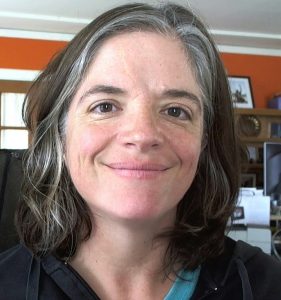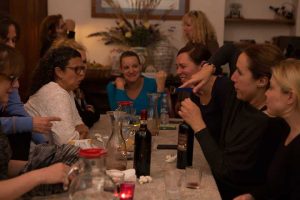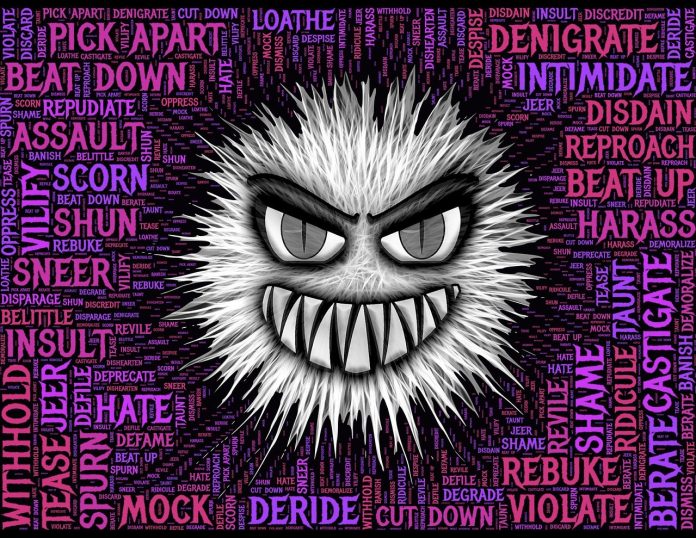By Meredith Broome
I am sitting at the dinner table at my best friend, Annemarie’s, house. Annemarie and I are in the third grade and have been best friends since kindergarten. Tonight we are eating spaghetti and meatballs with her mom, dad and two little sisters, and I remember a joke my father told me about balls, which seems relevant to the meatballs we’re eating. I stab a meatball onto my fork and hold it up in the air in front of me as a prop, not understanding that the ‘balls’ in the joke refer to testicles. I clear my throat and shout over the conversation.
“Speaking of balls…” I tell the joke, hit the punch line and look around, expecting a big laugh. Instead, Annemarie’s mother and father are frozen in what looks to me like fear. Then Annemarie’s mother’s face reshapes itself into steeled hatred, and she points it at me like a sword.
“Get up from the table,” she hisses. “You are excused.”
Nobody else moves. Annemarie’s ears turn red. She doesn’t look up from her plate. Shame weighs me down like a hot blanket as I walk heavily into the living room and sit down on the couch. I wait for what seems like hours listening to Annemarie’s family finish their dinner in silence. I can hear forks scraping plates. I try to listen even harder, until I think I can hear the sound of a cloth napkin being placed on the table, or the sound of Annemarie’s father, finally blinking his eyes.
I think that if I listen hard enough, maybe I can hear her mother’s thoughts and then I can understand what I said that was wrong. If I understand that, I can be ready with an apology that might keep me from getting in trouble. I listen so hard that every inch of me is like an ear with a glass to the doors of everybody’s thoughts.
When Annemarie’s mother pushes her chair back from the table it screeches so loudly it’s like the glasses I had up to all the doors shatter, all at once. I jump up off the couch, startled by the sound. When Annemarie’s mother comes into the living room, I am still standing there, frozen.
“Sit. Down.” She spits the words at me. Somehow my knees bend and my butt lands back on the couch. She draws herself up to her full 6 foot height, unholsters her right index finger and points it at my face. Whatever is shooting out of that finger makes it hard for me to breathe. My brain frantically tries to read her body, her thoughts, her soul. “What did I do?! What did I do?” The question burns through my brain.
“YOU…” She jabs her finger closer to my face. Then she stops. She does not know what to say next. My spine straightens itself. Her uncertainty wakes me up and fills me with a cold pulse of energy. Something crystallizes. Then, I know. I already have the information I need. I have had it for a while. It is simply this: Annemarie’s mom hates me. She has never NOT hated me. She thinks I am reckless, rude, and spoiled.
I quickly douse the part of me that hates me, too, so she can’t see it. She is the vulnerable one now, not me. She is the one in trouble. I coil into the corner of the couch like a rattlesnake and wonder if she can hear me rattling. I do not take my eyes off of her eyes. And then I wait for her to move.
I know how to be patient like this. I know how to hunt like this. My father has hunted me in this same way for years. He has sat waiting for hours, days, weeks—waiting for the mistake I always make that will bring him to my room at night. I only ever know after I make the mistake. When it happens, there is a faint rattle in my ears and a tiny smile on my father’s face that no one else ever sees.Then later, in the middle of the night, or the next night, I will feel my mattress sink under his weight and hear him say, “You know what you did wrong.” Then he is silent and I hold my breath before he speaks again. “Are you sorry?” he whispers so close to my ear it’s as if the question itself snakes into my brain. Am I sorry?
I have been sorry my whole life, until now. I have been sorry until this moment, coiled on the couch, waiting for this woman, my best friend’s mother, to move. I will cause her pain and I will not be sorry this time.
Annemarie’s mother is talking again. Her finger shakes and jabs at me. Her face and neck are splotchy and red. I hear phrases here and there. “What third grader makes a joke like that?” “You do not speak that way at the dinner table in MY house. In front of MY daughters.” “You think you’re so smart, don’t you…” She goes on this way for a while. I hate her for how protective she is of her daughters, that she thinks they are too good to hear the kinds of things that I hear every day. That I am not good enough for my best friend. That I am not good enough to be protected from these things, too. I am still not sure why telling the joke was wrong.
I make my face look appropriately ashamed. Shame is valuable currency in a Catholic household, and I have pockets of shame stashed everywhere to use in emergencies like this one. When my mother comes to the door to pick me up, I have already said my sorrys. I get up and walk out the door of my best friend’s house for the last time. I do not say goodbye.
At my desk the next morning at school, I am still coiled up and waiting. When Annemarie sees me, she rushes over, concerned and relieved. “What happened when you got home?” she asks. My face is made of stone. I have taken the warmth out of my eyes and stashed it way down deep, near my spine. I shrug. “Nothing happened. We all sat in the kitchen when I got home and laughed. We laughed for a long time.”
“I don’t understand,” Annemarie says. And I hate her for how naïve she is. I hate that she doesn’t see what’s coming, that she gets NOT to see what’s coming, when I have spent my whole life knowing what’s coming next and not being able to stop it.
I roll my eyes. My coil tightens. “We laughed at how stupid your family is. I mean, I can kind of understand how your sisters didn’t get my joke, but you? Your parents? I mean, I knew your mom was dumb, but your dad?” I pause and let that impact her, poised for the final strike.
Annemarie’s father had applied for a job at one of the hospitals where my father saw patients. He hadn’t gotten the job, and my father told me her family was having a tough time with money. I sharpen this information in my mind like a shiv. Then I strike. “I mean, when they asked my dad if they should hire your dad at the hospital, he said, “Don’t bother. That man is not smart enough to work here. That’s why he didn’t get the job.”
I hear gasps from the small crowd that has gathered around my desk. I put my hand on Annemarie’s shoulder, like I am going to say something nice. Like we are still friends. Lowering my voice to a stage whisper, I say “I mean, how embarrassing for you. Aren’t you embarrassed?” Annemarie’s face twists with shame and confusion. The bell rings and she falls into the chair at her desk, which is right next to mine. I see tears splash on her desk out of the corner of my eye, but I do not turn to look at her.
If I look at her, it will mess up my mean, and I am mean. Rule #1 for being mean: Don’t go up against someone with more power–pick on someone your own size. I knew I couldn’t go up against Annemarie’s mother. But I did know I could hurt her daughter. As soon as I understood that, I could not find any place in me that felt a connection to Annemarie anymore. I could not remember anything good about her. I could not remember why she was my best friend. I no longer had any access to her humanity. Or my own. I became a snake looking to absorb other people’s heat.
***
A couple of years later, I am having dinner with my new best friend, Janna, and her family. My sisters and I are all at a new school. My father has recently moved out, my parents are getting divorced and my mom has been working hard to get back into the workforce. I feel proud of my mother, because I see how hard she is working and realize how smart she is in a way I’d never noticed before.
Janna’s father, a professor at Harvard, asks me what my mom’s new job is, and I’m excited to answer. “It’s not a job, yet, it’s an apprenticeship at a company called Balloons Over Boston. She is doing a job program that trains women to get back in the workforce and then places them in apprenticeships in woman-owned companies. My mom really likes it!” I am flushed with pride and excitement, not only because I am proud of my mom, but also because I think that helium balloon bouquets and sculptures are so cool. I’m a little jealous that she gets to arrange them then drive them to parties all day. I thought it might be nice to have a job where people were always glad to see you coming.
I smile and wait for the inevitable barrage of enthusiastic questions from Janna and her family. Instead, there is silence. Then, Janna’s mom starts to laugh. She laughs so hard her face contorts and there are tears forming in her eyes. Periodically, she has to clutch the table for support.
I am shocked. I did not see this coming. I don’t know what to do.
Then Janna’s mom, who is the president of a real estate company, stops laughing just long enough to gasp, “So, your mother, a grown woman, works with balloons all day?!” Her mouth twists when she says the word ‘balloons’ as if she has just eaten a spoonful of earwax. She keeps going. “And this is supposed to get her back into the workforce HOW?! Is the balloon field an expanding field? No pun intended…” She pauses to laugh at her own joke. “And how will she move up in that field, work at a blimp company?”
“Helen,” Janna’s dad says sharply.
“Well, I’m sorry, Richard. If that’s not the funniest thing I’ve heard all week, I don’t know what is.” She dabs her eyes and shakes her head. “Oh my,” she looks at me and sighs. “Thank you for that. I don’t think I need dessert now. That was delicious.”
Janna, who had been excited about the balloons right before dinner, looks at me with pity. “Blimps,” she says, smirking and looking sideways at her mother. This sends her mother into peals of laughter again and Janna looks at me and shrugs, eyes wide. I know I am on my own. Janna’s dad mercifully changes the subject and I finish the meal fighting back tears. That is the last meal I have at Janna’s house, and I stop being her friend soon after that.
I recognize her mom’s particular brand of meanness. It is the same brand my family uses. It is the same kind of mean I used against Annemarie. It is impossible to fight against because it is fueled by an infinite supply of self-loathing, and I don’t have enough love in me yet, at 10 years old, to prevent that meanness from tearing me down. I don’t want to be torn down again.
About a month before my father moved out, I watched my parents, who were under the stress of their impending separation, tear my sister down. They asked her what she wanted for her birthday. When she cautiously asked for a bike, it was as though she put blood in the water. Both of my parents went after her, calling her ungrateful and spoiled, and worse. Before that, I might have joined in, seen that she was down and tried to kick her myself. The rule in our house was divide and conquer, every girl for herself. But this time, some kind of loyalty and protective instinct kicked in. I stepped into the middle of the chaos and said, “Stop, this isn’t fair.”
My parents stopped. So did both my sisters. I think everyone was shocked because I had never defended my sister before. I told them I agreed with my sister, that she needed a bike, and that they had asked her what she wanted, so she wasn’t out of line just for answering their question. My mom said, “I have never heard you speak up for your sister before.” Then they dropped it and left her alone.
My relationship with my sister didn’t really change after that. She was understandably suspicious when I stood up for her. It was hard for my sisters and me to trust one another’s motives because we were fierce and unforgiving with one another, and ourselves. See, it is quite possible that I defended her that morning and then turned and kicked her in the stomach later that afternoon. We were not taught to protect one another, we were taught to compete for resources. My sisters and I lived within a particular kind of unrelenting, violent code that I’ve only found since in other 3-sister families. But one thing that changed in me that day was that I saw my sister’s humanity–I saw her being bullied and I felt compassion. It is the first time I can remember feeling compassion.
My relationship with my self changed after that. I had never before felt the power of lifting someone up rather than taking them down. I am not sure I even realized that lifting someone up was an option, but I was glad to have found it. For the first time in my life, I felt kindness towards myself, and I really liked it. I wanted to figure out how to feel that more. So, when I realized my new best friend, Janna, also came from meanness, I walked away. I knew I wasn’t strong enough to lift myself up and pull her up with me. Staying friends with her would have taken me right back into meanness.
I would like to say I was never mean again after that, but the truth is, if I take an honest look behind me, there is a trail of bodies lying in the road that I put there and then stepped over in order to keep moving forward. It has taken me most of my life to learn how to treat the people I love with kindness, and I still struggle with it. Some days, I struggle with it a lot.




Very brave and sad writing that stuck with me. The truth is that we’ve all said horrible things in our lives that we wish we could take back. Some of us are just more honest about it than others. It takes a lot of character to admit it and change from it. Many don’t.